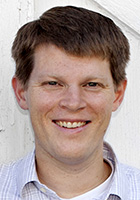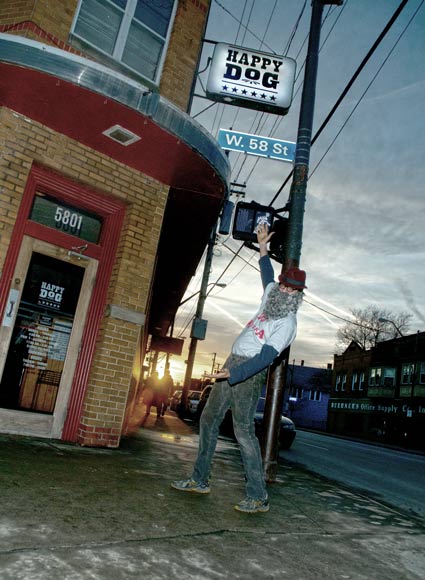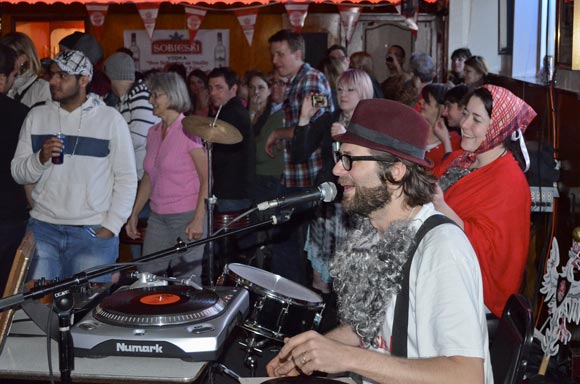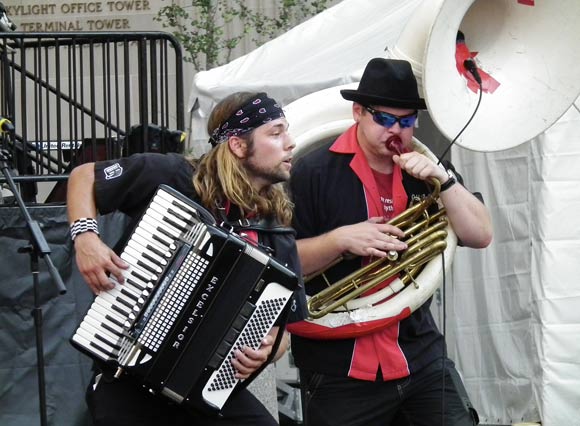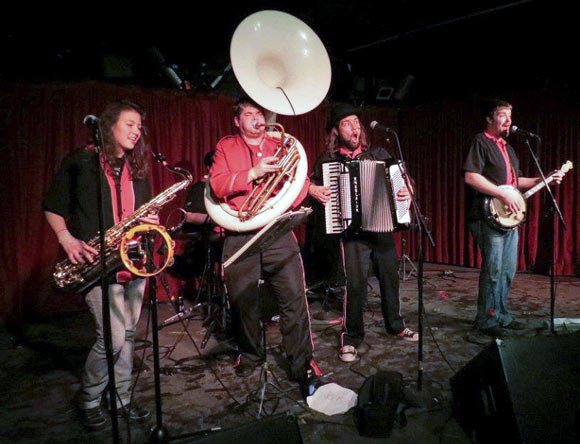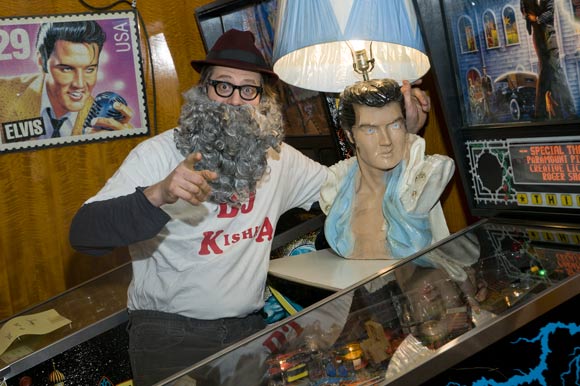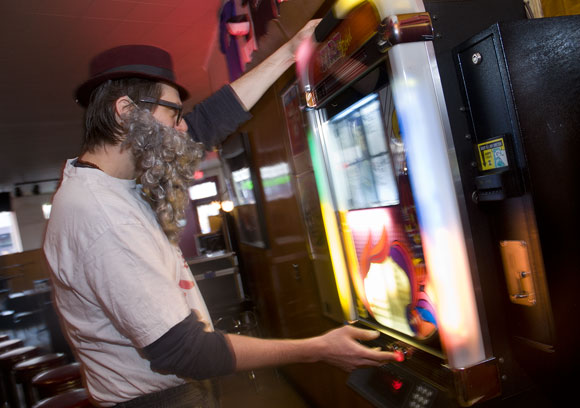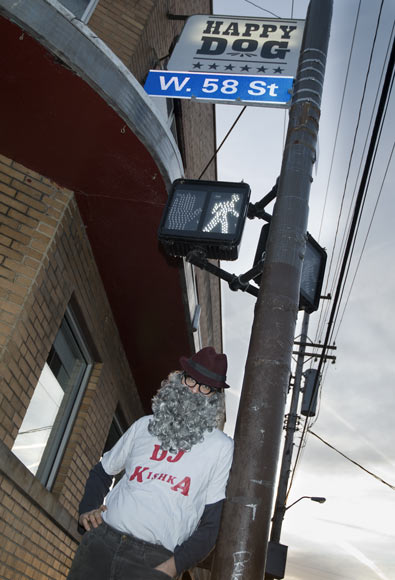polka fever: how hip new bandleaders are keeping traditional music alive and well in c-town
White socks, suspenders and a ridiculous fake beard have earned Justin Gorski -- a.k.a. DJ Kishka -- both fame and infamy.
Once a month on a Friday, Gorski, 36, dons his over-the-top attire and hosts the Polka Happy Hour at the Happy Dog, where he plays traditional and not-so-traditional polka tunes.
Gorski plays the accordion and spins polka favorites, including the oft-played tune that inspired his persona, “Who Stole the Kishka?” The song, about a sausage being pilfered from a butcher shop, includes the lines, “Fat and round and firmly packed / It was hanging on the rack / Someone stole the kishka / When I turned my back.”
Kishka loves to bust balls with unsuspecting guests, especially people talking on their cell phones. When somebody walks through the front door, he'll shout, "Look, Uncle Stash is here!"
The shtick plays off the well-worn stereotype of the Parma Polack, who lives in an aluminum-sided bungalow wearing white socks pulled up to the knees while a pink flamingo roosts in his front yard. Yet it’s also a heartfelt paean to Gorski’s upbringing in a traditional Polish family.
“It’s like you’re in your grandpa’s basement listening to records,” says Gorski, a Lakewood native who also plays piano in bands like New Soft Shoe, runs a vegan catering company (The Cleveland Vegan), and is a devoted new dad. “I’ve learned to make them like family," he says of the audience members. "That means we sometimes give each other shit.”
Kishka’s hilarious act has earned him the ire of some polka lovers, who believe he’s mocking the music they hold dear. But it also has won him the adulation of hipsters, who flock to the Happy Dog to dance in the aisles, turning one day a month into a sort of Polish Mardi Gras. It's not just hipsters, either -- the bar habitually is packed with an intergenerational mix of new and old oom-pah lovers.
“We’re bringing polka and ethnic music to a younger crowd,” says Kishka, who also spins at Sterle’s Country House and Stamper’s Bar. He’s also the mastermind behind the popular Dyngus Day celebration, a rite-of-spring festival that takes place on the Monday after Easter and has grown in recent years. “You’re seeing more of this. People are coming out to enjoy polka music.”
Beneath his goofy, bearded grin, Gorski is a fan of both the music and the culture. He grew up eating his grandmother’s stuffed cabbages and pierogis while listening to her speak Polish. Thus, the act is both loving tribute and ironic send-up, with as many layers of complexity as an onion from grandma’s garden.
“What’s great about polka music is that it’s so happy,” Gorski says with sincere passion. “[Cleveland polka legend] Frankie Yankovic called it ‘The happiest music this side of heaven.’ I talk about great players from Cleveland, and some come in and sing.”
Gorski isn't the only musician that's reinventing polka music and culture while boosting audiences. Younger folks like Jake Kouwe of the Chardon Polka Band, which spends two months each year performing at various Oktoberfests around the country, also are breathing new life into the music.
And while many ethnic social halls sadly are dying off, some are being reborn. Rick Semersky, the new owner of Sterle’s, has reinvigorated the decades-old restaurant by adding craft beers and bringing in music that appeals to a younger clientele. As "Rust Belt Chic" gains popularity, so too it seems does the polka revival.
The unlikely comeback couldn’t occur at a better time, says Andrew Votaw of the radio show Polka Changed My Life Today, which airs weekly on WRUW 91.1. Many of Cleveland’s once-ubiquitous ethnic social halls now struggle with attendance. Votow hopes the revitalized polka scene will inspire more young people to take an interest.
“The challenge is to get the younger crowd to show up at an actual polka dance at an ethnic dance hall," says Votaw. "Usually, I’m the youngest person at the event. There’s a polka event going on most nights of the week here -- you just have to search for it.”
Votaw, who was recruited as co-host when he began calling in as "Andrew the Mailman" (he’s an actual mail carrier in Lakewood), says his own greatest regret is not celebrating polka music with his grandparents before they passed away. “They spoke Slovak,” he recalls. “They always had polka music blasting in their house.”
On Thursdays from 7 to 8 p.m., Votaw and his co-host Gary Rozak -- a.k.a. Dr. Polka -- play a mix of polka classics and contemporary songs done polka-style. They act as polka emissaries teaching listeners about Cleveland’s deep polka heritage and the various styles of music. “Once people give it a chance, they usually like it,” says Votaw.
The live polka scene is making a comeback, too, as more and more music venues add polka to the lineup. Just ask Jake Kouwe of the Chardon Polka Band, who just returned from a beer festival in Michigan and is booked almost every night of the week.
“This started out as a goofy little high school project with five dudes, and we now play all over the country,” says the tattooed, long-haired Kouwe, who also writes his own songs, including the hilarious “Two Sisters Polka” about falling in love with gorgeous twins. “But there is and there isn’t a good polka scene out there -- it isn’t like it used to be.”
Yet Kouwe and his bandmates -- among them a 66-year-old drummer nicknamed Pops -- make a living by playing to diverse audiences that range in age from eight to 80. “We might play a nursing home Wednesday, then the Grog Shop on Friday, then the Burton Library. Then we might drive to Helen, Georgia, for a week for Oktoberfest.”
In addition to pulling from their library of original songs, the Chardon Polka Band takes pop ditties by Queen, Lady Gaga and Justin Bieber and polka-tizes them for the crowd.
Kouwe also gets flack for reinterpreting traditional polka, but the attacks are misguided, he says. “People say, ‘You guys aren’t serious, you have long hair, blue mohawks and tattoos.’ The reality is, we care very deeply about the music,” he says. “What the old fogies don’t realize is you’re not going to keep it alive with frilly shirts and bowties.”
Gorski hopes that over time, Dyngus Day will evolve into a citywide celebration that encourages Clevelanders to honor their ethnic heritage -- be it Polish or otherwise. The event takes place on April 1 and features a parade of accordion players and the crowning of Miss Dyngus (who dons a crown of sausages).
Cleveland’s new Polka King believes that the music offers something for everyone.
“The polka heritage in Cleveland is not just Polish but ethnic, and it’s a celebration of that, and hence, Cleveland,” he says. “Cleveland in a way is about how ethnic people were treated over the years -- growing up, we always caught grief for being Polish.”
If the polka revival inspires more young people to dance, then there’s hope the traditions will continue, says Votaw. “The older people would love it” if more young people showed up at the Eastern European social halls, he says. “They’ll be happy to teach you to dance.”
Polka Happy Hour with DJ Kishka at Happy Dog
